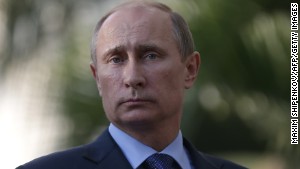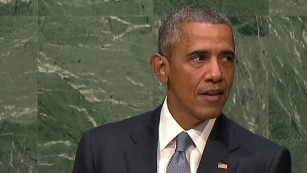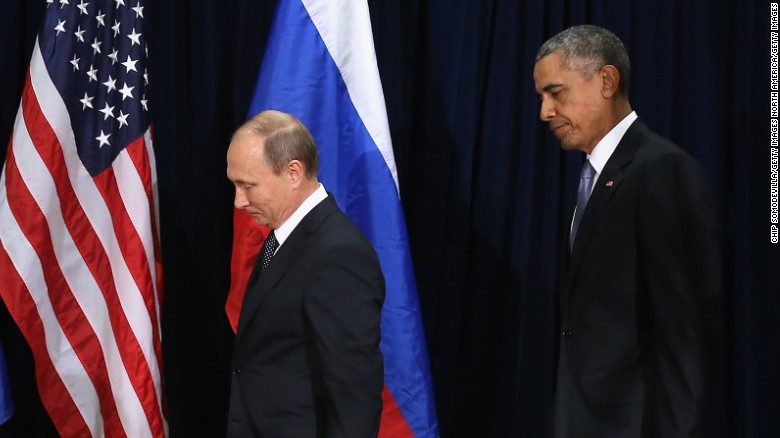Putin steals Obama's thunder on the world stage
Vladimir Putin is back -- and stealing Barack Obama's thunder.
The Russian president showed up at the United Nations on Monday for the first time in a decade, proposing a coup against U.S. global leadership and seeking to wrest control of a coalition battling ISIS away from America's grip.
And he wasn't the only leader of a country challenging the United States to effectively upstage Obama at the annual global meeting, which a U.S. president traditionally uses to command the spotlight.
Speeches by Chinese President Xi Jinping and Iranian President Hassan Rouhani on the 70th anniversary of the creation of the world body also left Obama defending not only his personal foreign policy legacy, which is already under assault at home from Republican presidential candidates, but the entire concept of a world order based on seven decades of U.S. global leadership.
The day of speech-making, which also included an address by Cuban leader Raul Castro and Egyptian President Abdel Fattah el-Sisi, underscored the multipolar challenges to U.S. power, as slumbering empires seek a resurgence and America faces military challenges from Eastern Europe across the Middle East to Asia.
Obama hits Putin, Republicans in U.N. speech
Obama has embraced a policy of encouraging other actors to address threats in their region, for instance pulling Saudi Arabia and Jordan into the coalition to fight ISIS. But the approach means that other forces joining the fray -- including Iran and now Russia in Syria -- may not necessarily agree with America's preferred end game.
Obama offered a full-throated justification of his policies -- particularly emphasizing diplomacy over the use of force -- in his own U.N. address, but he seemed on the defensive amid claims by critics that his policies have emboldened U.S. adversaries.
The most ardent challenger on Monday was Putin, who appears to be probing openings in Ukraine and Syria where he believes the U.S. president will not resist. He recently ordered a military buildup in Syria apparently in support of President Bashar al-Assad, a longtime Russian client, and went behind Washington's back to conclude an anti-ISIS intelligence alliance with Iran, Syria and Iraq just this weekend.
Russia criticizes U.S. interventions
Putin's message at the U.N. podium Monday was a simple one: U.S. interventions and unilateralism have backfired in the Middle East, and it is time to try something new.
His speech will do little to undercut a widespread impression in many Western capitals that his aim in Syria is not just to bolster a Moscow ally but, primarily, to thwart U.S. power and influence in the Middle East.
Putin took particular aim at U.S. involvement in Iraq and Libya, which he said fostered a power vacuum filled with "extremists and terrorists."
"Do you realize now what you've done?" he asked.
He called for a ministerial conference and then a U.N. resolution to reorient strategy against ISIS -- even though many U.S. observers believe his real aim is to prioritize attacks against rebels opposed to al-Assad and to thwart U.S. aspirations in a region in which Obama has shown little appetite of becoming embroiled.
Russian President Vladimir Putin


Like Russia, China is also a nation that once enjoyed great power and is now seeking a rebound. Xi, president of a nation that Washington faults for stoking tensions in Asia with its territorial claims at sea while increasingly elbowing the United States in the Pacific, hit out at criticism of China's communist system.
And in a thinly veiled warning against new U.S. military adventures, he warned that "those who adopt the high-ended approach of using force will find that they are only lifting a rock to drop on their feet."
And Iran, which the United States accuses of supporting terror throughout the Middle East, portrayed its deal with world powers over its nuclear capabilities as an example of U.S. capitulation and blamed "incorrect actions of newcomers to the region and naive transregional actors" -- a clear reference to Washington -- for the chaos in the Middle East.
Sensing the rising challenges to U.S. power that were all too evident at the U.N. on Monday, Obama openly faulted the perception -- fueled by Republican presidential candidates -- that he is a weak leader who has emboldened American adversaries.
Obama looks to defend his legacy
He seemed to be addressing the historians who will consider his legacy as much as his contemporaries on the world stage, especially when he defended his policy of cooperating with some of the very leaders he faults.
"We see in our debates about America's role in the world a notion of strength that is defined by opposition to old enemies, perceived adversaries, a rising China, or a resurgent Russia, a revolutionary Iran," Obama said.
He was particularly contemptuous of Putin, mocking "state-controlled media" notions of a revived Russia. He said Ukrainians wanted to align with Europe not Moscow and pointed out that sanctions had led to a "fallen ruble and the emigration of more educated Russians."
"History is littered with the failure of false prophets and fallen empires, who believed that might always makes right, and that will continue to be the case. You can count on that," Obama said.
But Obama also acknowledged that he was open to a realistic approach that could see him work with Russia and Iran to fight ISIS and back a "managed transition" away from al-Assad.
Seeing al-Assad remain in power for some time and cooperating with Iran on Syria are positions that the administration has long frowned on, and their embrace exposes Obama to criticism from those at home as well as from the adversaries that he faced on the world stage Monday.
5 things to watch at the U.N. General Assembly this week

Obama: We want a strong Russia that will work with us
Florida Sen. Marco Rubio, who is making foreign policy a centerpiece of his run for the 2016 Republican presidential nomination, warned that Putin was making a case that American leadership had failed in the Middle East and Obama was to blame.
"The President has fallen into that. He's in fact strengthened Putin's hands," Rubio said in an interview with NPR that aired Monday, complaining that states in the region were despairing at the lack of a U.S. strategy to beat ISIS.
"If left with a choice between Russia and nothing, they're going to choose Russia," Rubio said.
Obama has made no secret of the fact that he disdains Putin as a bully and the Russian leader appears to view his opposite number as weak. The ill regard was noticeable in the days leading up to their meeting along the U.N. sidelines, with each side arguing that the other had pushed for the meeting and declaring that the talks were focused entirely on their own priorities -- Ukraine in the case of Obama and Syria for Putin.
While Obama arguably lost the power play by participating in the meeting -- he has shunned Putin since his annexation of Crimea in 2014 -- both sides ultimately conceded that they still need to work with each other by showing up and awkwardly shaking hands for the cameras Monday.
It seemed clear that Obama did not particularly want to be there, but Ben Rhodes, a deputy national security adviser, told CNN's "The Lead" on Monday that it would have been "irresponsible" not to meet Putin and test his intentions.
It was also an appearance that will likely play better in Moscow, where Putin wants to convince Russians he is a key actor on the global stage, than in Washington.
News Courtesy: www.cnn.com











